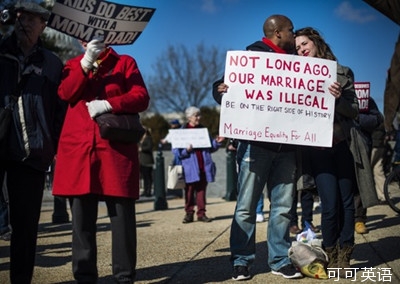JUDY WOODRUFF:And we return to today's Supreme Court arguments involving the federal Defense of Marriage Act with a debate of our own.
Supporting the law is Ken Klukowski. He's the director of the Center for Religious Liberty at the Family Research Council and a Breitbart News legal columnist. And Mary Bonauto opposes DOMA. She is special counsel for the group Gay and Lesbian Advocates and Defenders.
And welcome to the you both to the NewsHour.

KEN KLUKOWSKI, Center for Religious Liberty, Family Research Council: Thank you.
JUDY WOODRUFF:So, we were just saying before this conversation began there was some discussion at the court today about jurisdiction, but we're going to set that aside and talk about the core of the argument today.
First of all, in the—Mary Bonauto, in the analysis I have been reading, there is—there are a number of folks who are concluding that there are enough votes now on the court to strike down DOMA. How did you read generally what you heard from the justices today?
MARY BONAUTO, Gay and Lesbian Advocates and Defenders: Yes, I'm not prepared to make any predictions based on an oral argument.
But, clearly, the questions were going to two key issues. One is when the federal government has for so long deferred to a state's determination about who is married, why in 1996 did they change the rules when it looked like same-sex couples might begin to marry and impose a federal definition?
And then, secondly, when you have all these protections that are available to married people, you know, why are you taking people from Massachusetts, Connecticut, Vermont, and saying their marriages don't count for Social Security and family medical leave and treating them like they're single, even though they're legally committed in marriage?
JUDY WOODRUFF:Well, let's talk about those two different streams of argument today, one, loosely, discrimination, the other one, loosely, the federal vs. the states.
And, Ken Klukowski, does one of those strands of argument have greater weight, did you think, today in what you heard?
KEN KLUKOWSKI:Well, the reality is that I think it's—looking at it from a different aspect, the reality is, DOMA—DOMA filled in the blanks—and there's a lot of blanks.
About 1,100 provisions of federal law reference marriage. But it wasn't the first one. Regarding, for example, filing taxes, if you're going to file a joint married tax return, it's the tax code that specifies that if you are married, but separated from your spouse—now, you're still legally married under the state, but it's illegal for you to file a married tax return. You must file an unmarried person tax return.
Also, if you are married to someone who is not a citizen and they're not in the country, you have to file a single tax return. There are aspects of immigration law. So, there are many areas of law going back decades where Congress has had the definition of marriage.
JUDY WOODRUFF:You're saying there is a legitimate role for the federal government, you're saying, in regulating these relationships?
KEN KLUKOWSKI:That's exactly right.
Who can get married is a state issue. But what federal benefits, mainly, usually entitlements, what federal benefits go to which sort of unions, that's a legitimate exercise of federal power, so long as it's one of Congress' powers in Article One, Section Eight of the Constitution.
JUDY WOODRUFF:And we heard Justice Kennedy today questioning that in particular, didn't we, the role of the federal government in overriding the states in determining how these laws are going to be interpreted.












